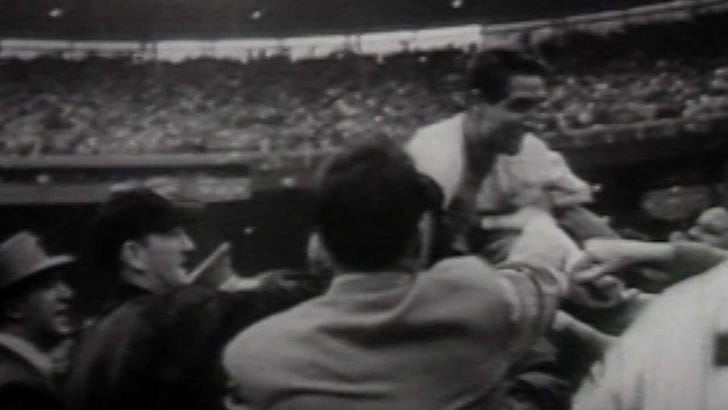Great Britain – hey, The Beatles are from there – gave the United States a tougher time than expected, stunned Colombia, and ended its World Baseball Classic run in the wee hours of this morning by giving Mexico one hell of a scare before ultimately falling, 2-1, in Phoenix, where it was still late last night. (These are East Coast-written show notes, today in an insomniac fit at 3 a.m., if you’re curious, as opposed to the usual break-into-the-day-between-coffee-and-work sweet spot for little Sports-Reference rabbit holes. Further updates to the writing schedule may or may not be given.)
Trayce Thompson (who has a birthday today, but that’s coincidental – these show notes will not be a birthday repository, but they will be mentioned and played up when the mood strikes) played for Great Britain, which was kind of weird because, you know, his brother Klay has kind of won an Olympic gold medal playing basketball for the United States. And Trayce was born in Los Angeles, because his and Klay’s dad, Mychal Thompson, played for the Showtime Lakers. Mychal was born in The Bahamas, which… qualifies players for Great Britain, because Commonwealth or something?
Sports citizenship is weird like that. Imagine if Trayce Thompson was a soccer player. The United States, his home country, has a team. The Bahamas, his father’s birth country (Mychal moved to Miami for high school in the 1970s), has a team. Great Britain, the current athletic home country for Trayce, does not have a soccer team. Except in the Olympics. But Trayce Thompson is not under 23, and therefore wouldn’t be part of an Olympic men’s soccer team.
If Great Britain did have to break up its baseball operations, because obviously they’re getting too powerful, history says that Scotland would be the team to watch, what with the Glasgow roots of the best pitcher and hitter (by WAR) to come from the UK (Harry Wright is in the Hall of Fame, but as a pioneer — dude’s roots were in cricket, including dropping out of school at 14 to play for a pro cricket team called the Harlem Dragonslayers — yes, the Harlem in New York — with his father). Jim McCormick, the Cleveland Blues pitcher who was either the first or second 40-game loser in major league history, because we don’t have the day-by-days for the 1879 National League.
That’s a rude way to introduce McCormick, who was the 1880 National League wins leader with 45 — with a league-high 72 complete games and 657.2 innings pitched — and the 1883 ERA champion at 1.84, but he and George Bradley, that year with the Troy Trojans, tied for the nascent National League’s lead in defeats, a mark that’s only been surpassed three times – all in the subsequent five seasons, with John Coleman setting the record (also the hits allowed record, with 772… nobody else has been above 700) by going 12-48 for the Philadelphia Quakers, who won only five other games in their inaugural season… but now are the defending champions of the league, 140 years later under a different name (“Phillies?”), so guess it worked out alright for them, and for Coleman, who became an outfielder for the rest of the 1880s.
The best British hitter and McCormick’s fellow Glaswegian? Also a Thompson. Wait, no, not a Thompson. Bobby Thomson.
Liverpool? They’ve only given us Tom Brown and Ned Crompton, and you’ve never heard of them before, and you won’t now, because this bonus space is where we shout out Danny Cox, the pride and joy of Northampton, England, and Chattahoochee Valley Community College in Alabama. Not just because he’s the only good British-born player, ever, who has highlights in color, but because he taught me a change-up grip in the elevator of my building as my dad and I came in from a catch in 1989, when it seemed like his career was over before a really nice comeback that included getting a World Series ring with the 1993 Blue Jays (and got off the hook for the loss in Game 6 — the Blue Jays had a 5-1 lead at the start of the seventh inning, Dave Stewart gave up a three-run homer to Lenny Dykstra; Cox came in and only retired one of the five batters he faced; Pete Incaviglia hit a sacrifice fly off Al Leiter to give the Phillies the lead; yes, that was just an excuse to mention Dykstra and Incaviglia — thanks to Joe Carter’s homer).
Okay, that wasn’t really a highlight for Cox, even if the ring’s the thing. So, here are a couple, as promised, in full color.
And despite being a pitcher, Cox has as many career postseason runs batted in as Mike Trout.













Share this post